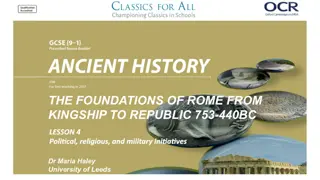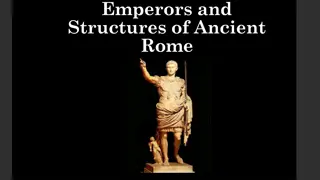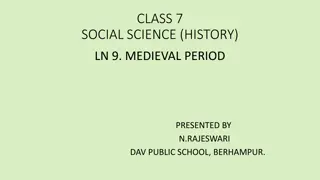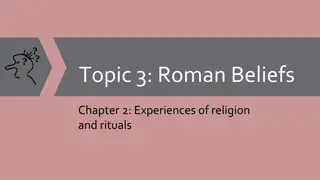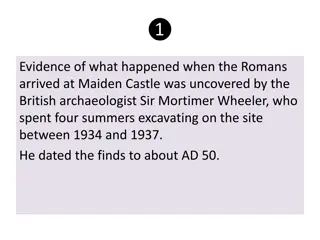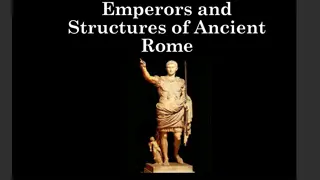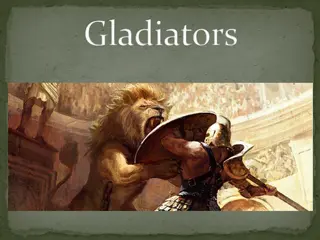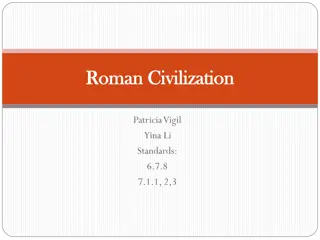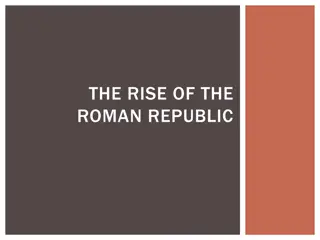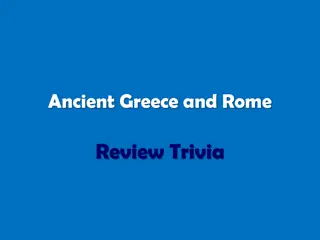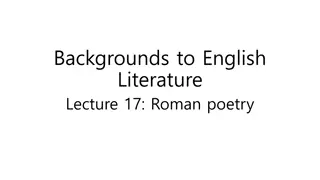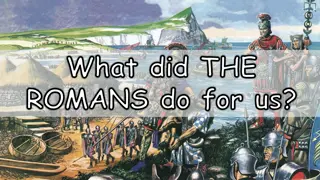Insights into Life in Ancient Rome: Excavations, Pompeii, and Roman Society
Explore the fascinating world of Ancient Rome with a focus on excavations at Pompeii and Herculaneum revealing insights into daily life, patrician families, and archaeological methods. Uncover the impact of ancient Roman actions and achievements on Europe and the wider world, and delve into the patterns of change in areas like Crime and Punishment and Health and Medicine. Discover the story of Rome through the lens of archaeologists and their excavation techniques.
Download Presentation

Please find below an Image/Link to download the presentation.
The content on the website is provided AS IS for your information and personal use only. It may not be sold, licensed, or shared on other websites without obtaining consent from the author. Download presentation by click this link. If you encounter any issues during the download, it is possible that the publisher has removed the file from their server.
E N D
Presentation Transcript
02 LIFE IN ANCIENT ROME CHAPTER 02
02 LIFE IN ANCIENT ROME What Will I Learn? Investigate the lives of people in Ancient Rome Explain how their actions contributed to the history of Europe and/or the wider world Explain how their achievements contributed to the history of Europe and/or the wider world Illustrate patterns of change in Crime and Punishment or Health and Medicine Explore the Nature of History
02 LIFE IN ANCIENT ROME The Story of Rome
02 LIFE IN ANCIENT ROME How do Archaeologists Excavate Sites?
02 LIFE IN ANCIENT ROME Excavations at Pompeii and Herculaneum The spread of ash clouds from Mount Vesuvius Pliny the Younger
02 LIFE IN ANCIENT ROME What have the Excavations Shown?
02 LIFE IN ANCIENT ROME What have the Excavations Shown? Source 1 There is an old archaeological joke that Pompeii has died twice: first, the sudden death caused by the [volcanic] eruption; second, the slow death that the city has suffered since it began to be uncovered in the mid-eighteenth century. Despite the heroic efforts of the Pompeiian archaeological service, the city is disintegrating (decaying). It is a gradual process of dilapidation (ruin), aggravated (worsened) by earthquakes and mass tourism, and given an extra helping hand by the rough methods of the early excavators; by allied bombing campaigns in 1943; and by thieves and vandals for whom the archaeological site, large and hard to police, is an enticing target. (from Mary Beard, Pompeii: The Life of a Roman Source 2 Though our tools today the trowels, shovels, buckets and brushes are nearly identical to [those used in past excavations], many advances have been made in archaeological method and methodology over the course of the past 70+ years. We are now able to re-examine [the work done by archaeologists]. ( What Happened in Pompeii , www.interactive.archaeology.org/Pompeii/histor y.html) Town [2008])
02 LIFE IN ANCIENT ROME Roman Lives The Patrician See Skills Book p. 14,16 The Domus
02 LIFE IN ANCIENT ROME Patrician Families Toga Stola Tunic
02 LIFE IN ANCIENT ROME Patrician Families Source 2 Richer families had two simple meals for breakfast and lunch, and waited until the evening for the main meal of the day. This was after a visit to the baths. The main meal, called the cena, had three courses. The men and women lay on couches around a central table. Slaves served the food and musicians entertained during the meal. Sometimes people ate so much that they deliberately got sick so that they could begin again. Source 4 For the most part ancient cities were not zoned as modern cities are. Rich and poor lived side by side, large houses with many tiles sharing the same streets and districts as tiny hovels. The same diseases, and much the same dirt, killed the children of rich and poor alike. Questions: 1. How did the patricians show off their wealth? 2. How did the patricians organise their families? 3. What common experiences did rich and poor have? 4. Why, do you think, we know a great deal about the haves? Explain your answers. Source 3 About the privileged the haves of the Roman world we know a great deal. All over the empire the rich paraded their wealth in large and expensive accommodations, measured not by floor area but by the number of tiles on the roof. And they indulged in the many pleasures that money could buy, from silks to oriental spices, skilled slaves to pricey antiques.
02 LIFE IN ANCIENT ROME Entertainment What role did each of these play in entertaining the people of Ancient Rome? See Skills Book p. 15
02 LIFE IN ANCIENT ROME Roman Lives The Plebeian Can you identify what is happening in each part of the insula?
02 LIFE IN ANCIENT ROME Roman Lives Roman Women What is happening in each of these frescoes? See Skills Book p. 17
02 LIFE IN ANCIENT ROME Sources on Roman Women Source 1 A woman s whole role is to care for children, for her husband, and for her home For human activity is divided into two spheres, one pertaining (relating) to life outside the home and one to life within it: as we might say public and private . God assigned a role to each sex; women have the care of the home, men of public affairs, business, legal and military activities indeed all of life outside the home. (John Chrysostom, The Kind of Women Who Ought to Be Taken as Wives [4th Century]) Source 2 Pompullius Antiochus, her husband, set up this gravestone to Caecilia Festiva, his dearest, sweet wife, hard-working and well-deserving, who lived with me for 21 years without a contrary word. She was a wife most virtuous and chaste, incomparable among women. Farewell. (A gravestone inscription) Source 4 [Mother to daughter] greetings. If you are well, it would be as I pray to the gods to see you well. I received the letter from you in which you inform me that you have given birth. I prayed to the gods daily on your behalf. Now that you have escaped [from danger], I shall pass my time in the greatest joy. I have sent you a flask of oil and dried figs. Source 3 Visitor, I have something to say to you; stop and give a read. This is a common tomb for an uncommon woman. Her parents gave her the name, Claudia. She loved her husband with all her heart. She brought forth two children. One she left above the earth, the other below. Her conversation was lovely, her walk was graceful. She managed the household. She wove in wool. I have spoken. Go on your way. (A letter) (A gravestone inscription)
02 LIFE IN ANCIENT ROME Julius Caesar Army Commander
02 LIFE IN ANCIENT ROME Roman Army
02 LIFE IN ANCIENT ROME Roman Army Julius Caesar Source 2 Caesar was a most skilful swordsman and horseman, and showed surprising powers of endurance. He always led his army, more often on foot than in the saddle, went bareheaded in sun and rain alike and could travel for long distances at incredible speed If Caesar s troops gave ground he would often rally them in person, catching individual fugitives (deserters) by the throat and forcing them round to face the enemy again He always addressed his soldiers not with My men ; but with Comrades which put them into a better humour. He fixed the daily pay of the regular soldiers at double what it had been and occasionally gave each man a slave. (Suetonius, Life of Julius Caesar [c. 110 AD]) Source 4 What made Caesar hated was his passion to be king. (Plutarch Julius Caesar [c. 110 AD]) Source 5 When his friends advised him to have a guard, and several offered their services, he would not hear of it; but said it was better to death once than always live in fear of it. (Plutarch Julius Caesar [c. 110 AD])
02 LIFE IN ANCIENT ROME Roman Lives Slaves Their skins were seamed all over with marks of old floggings, as you could easily see through the holes in their ragged shirts that shaded rather than covered their scarred backs; but some wore only loin-cloths. They had letters branded on their foreheads, and half-shaved heads and irons on their legs. Their complexions were frightfully yellow, their eyelids caked with the smoke of the baking ovens, their eyes so bleary and inflamed that they could hardly see out of them and they were powdered like athletes in an arena, but with dirty flour, not dust. (Apuleius The Golden Ass [165 AD]) See Skills Book p. 18
02 LIFE IN ANCIENT ROME Spartacus pushing his way towards Crassus himself through many flying weapons and wounded men, [Spartacus] did not indeed reach him, but slew two centurions (officers) who fell upon him together. Finally, after his companions had taken flight, he stood alone, surrounded by his foes, and was still defending himself when he was cut down. (Plutarch s Life of Crassus)
02 LIFE IN ANCIENT ROME Crime and Punishment in Ancient Rome Who made the law? Who enforced the law? What were the crimes? What were the punishments?
02 LIFE IN ANCIENT ROME Health and Medicine in Ancient Rome Who was Galen? What were the four humours?
02 LIFE IN ANCIENT ROME Health and Medicine in Ancient Rome How did the Romans cure diseases? Roman Cures Sickness Cure Sore eyes Boiled liver Epilepsy Drink the blood of a slain gladiator Dysentery (diarrhoea) Egg yolk mixed with poppy juice and wine Skin infections Broccoli Swelling, bruises Apply unwashed wool Acne Apply dried slab of crocodile meat Warts Burnt cow dung Fatigue Tarragon, a herb
02 LIFE IN ANCIENT ROME Ancient Rome The Achievements Concrete Architecture
02 LIFE IN ANCIENT ROME Ancient Rome The Achievements Aqueducts and water supply
02 LIFE IN ANCIENT ROME Ancient Rome The Achievements Towns and cities Cities founded by the Romans: Paris, London, Lyons and Cologne Grid pattern of streets
02 LIFE IN ANCIENT ROME Ancient Rome The Achievements Language Many modern European languages are based on Latin Politics Rome was not a democracy Roman ideas used to promote democracy in 18th and 19th centuries Influence on the American Constitution in 18th century Roman Words English Words Aqua (water) Aquarium Semi (half) Semi-final Sub (under, below) Submarine Super (above) Superior Trans (across) Transport
02 LIFE IN ANCIENT ROME Ancient Rome The Achievements Religion the spread of Christianity
02 LIFE IN ANCIENT ROME Ancient Rome The Achievements Art Frescoes and sculpture Influence on the Renaissance Calendar
02 LIFE IN ANCIENT ROME Ancient Rome The Achievements What did the Romans ever do for us? See Skills Book p. 19
02 LIFE IN ANCIENT ROME Which are Characteristics of Ancient Rome?
02 LIFE IN ANCIENT ROME Preparing for CBA 2
02 LIFE IN ANCIENT ROME Create your own mind maps for each of the above features
02 LIFE IN ANCIENT ROME How do we Know About Ancient Rome?
02 LIFE IN ANCIENT ROME How do we Know About Ancient Rome?
02 LIFE IN ANCIENT ROME Create your own mind maps for each of the above features
02 LIFE IN ANCIENT ROME Create your own mind maps for each of the above features






